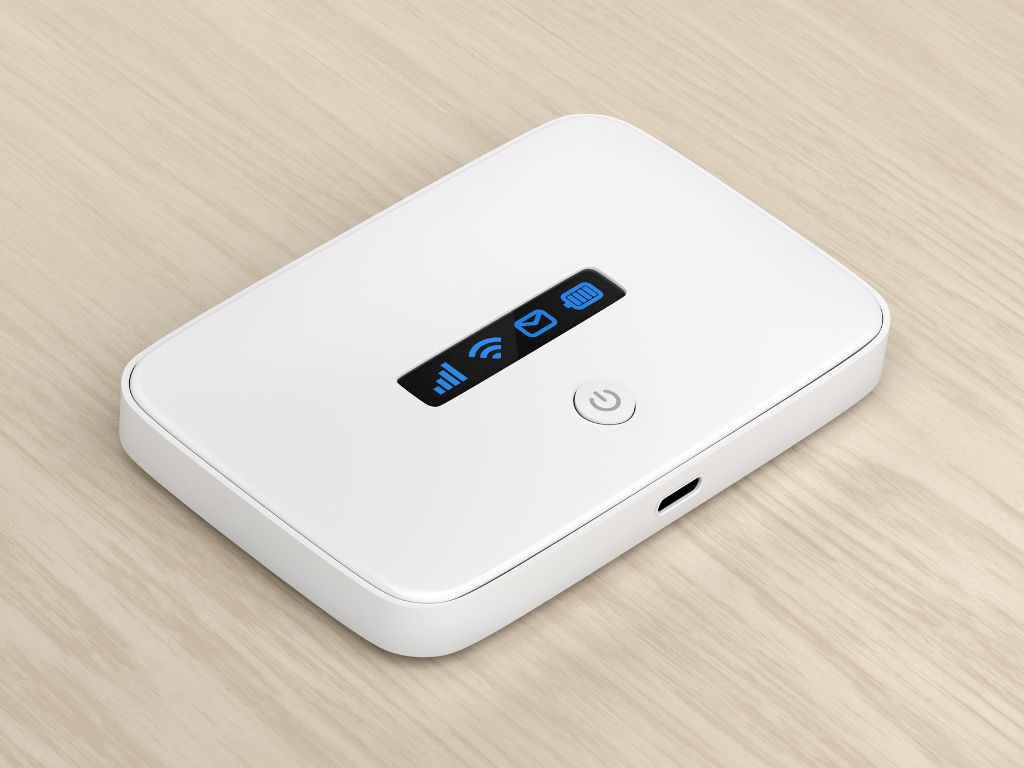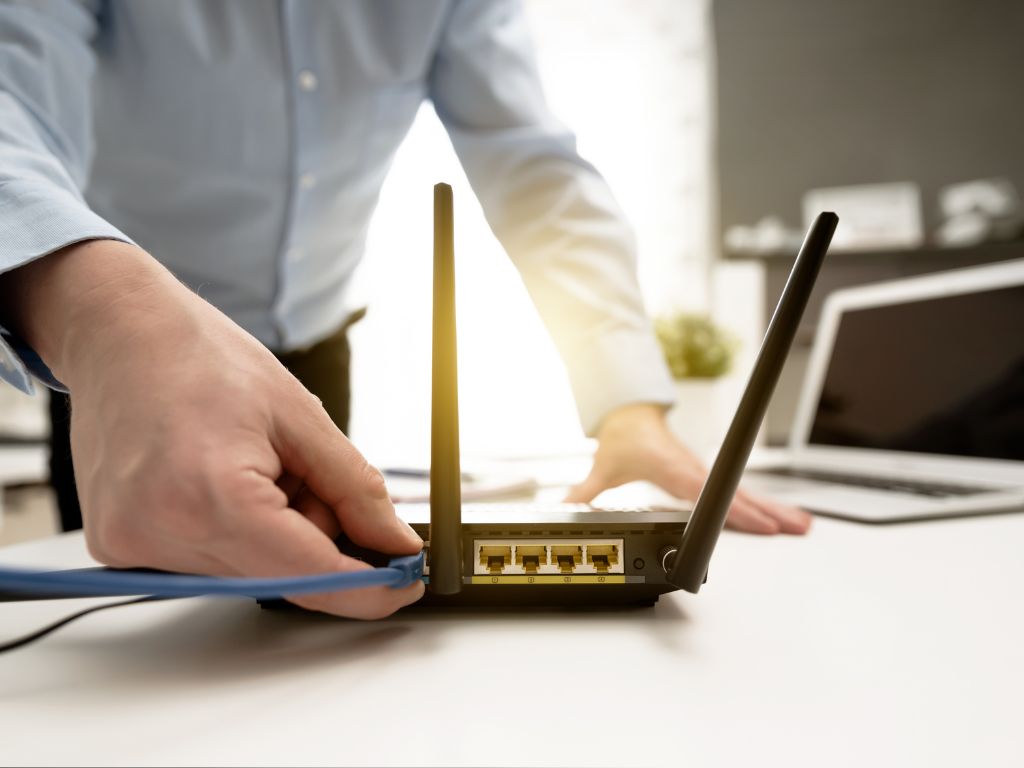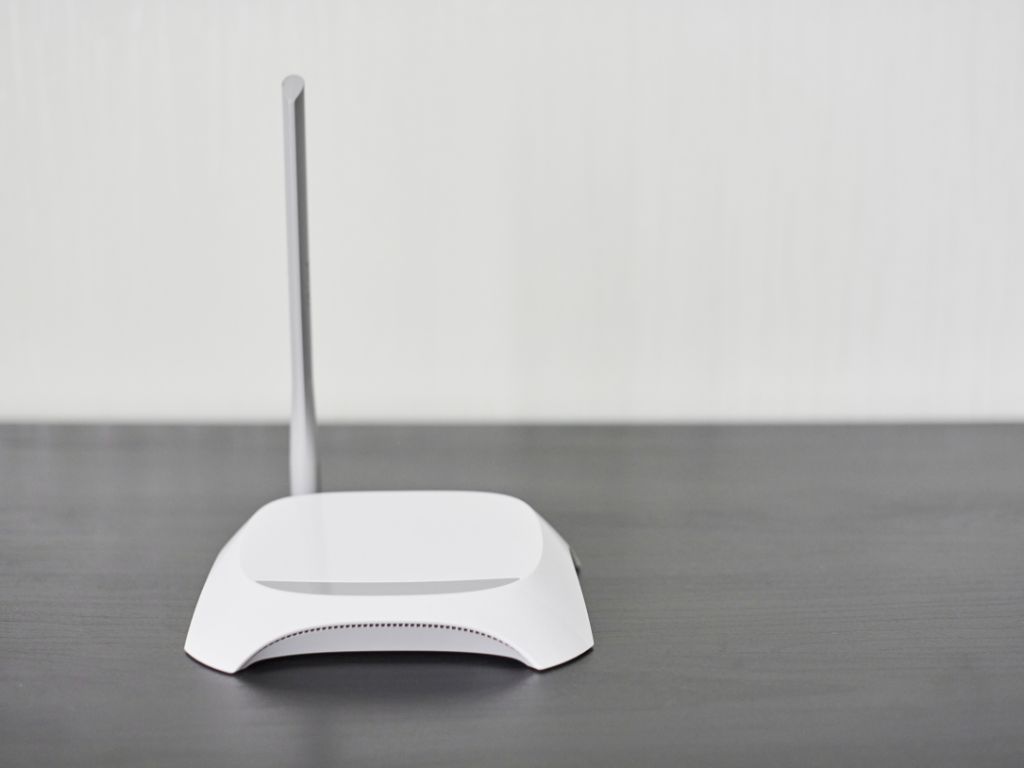If like me, you travel a lot and need to connect multiple devices to the internet, a portable travel router may be a good investment. After all, if you work online, having a good internet connection while traveling is key to your ability to make a living!
Finding fast and reliable WiFi is one of the most common challenges faced by digital nomads all around the world. I’ve been traveling and working remotely full-time for the last couple of years, and WiFi-related problems rank among my least favorite issues to overcome.
Happily, there are various high-speed portable WiFi routers that you can buy to add to your digital nomad setup. In this post, I’ll be reviewing 7 of the best portable routers on the market today. I’ll also be discussing some important considerations to keep in mind when choosing the best portable WiFi router for travel.
What is a Travel WiFi Router?

First off, a bit of terminology. For a long time, I wasn’t aware of the difference between portable travel routers (also known as travel WiFi routers) and hotspots, and I used the terms interchangeably.
It’s true that portable travel routers and hotspots both create a private WiFi network that you can connect multiple devices to. However, there is one key difference between these two pieces of tech: where the initial internet connection comes from.
Routers generally need to be connected to an existing internet connection, such as a public WiFi network, or a wired internet connection. Hotspots usually connect to mobile/cellular data (4G for example) and use this to generate a private WiFi network that you connect your devices to.
Why Do You Need a Travel Router?

There are several reasons why you might want or need a travel router.
If you, like most digital nomads, have multiple devices that need an internet connection (a smartphone, laptop, iPad, etc.), you would normally have to connect each one separately each time you need to join a new WiFi network.
However, if you have a travel router, you only need to connect one device (the router) and then you’re all set.
Some of the best portable WiFi routers for international travel also have the ability to connect to a physical, wired ethernet connection. This is often faster than WiFi. It also means that you can “share” this high-speed WiFi with your other devices, regardless of whether there’s also a public WiFi network available.
Travel routers tend to be small and lightweight, so they’re easy to carry around while traveling. Additionally, many wireless travel routers come with extra handy features such as USB ports for charging your devices on the go.
Best Travel Routers in 2023
Okay, so you’ve decided to get a small WiFi router for traveling. But which one should you buy?
Here’s my pick of 7 of the best portable WiFi routers for digital nomads and remote workers. I’ve included a range of different brands, styles, and price points within this list.
Each of these products has great reviews online and will serve you well throughout your remote work adventures. Make sure to add a travel router to your digital nomad packing list.
1. GL.iNet (Beryl AX) Pocket-Sized WiFi
If you’re looking for the best travel router for hotels, take a look at the GL.iNet Beryl AX.
This router has 2 ethernet ports allowing you to plug it into wired internet connections (e.g. a fiber connection), either at home, a hotel, or somewhere else on the road; allowing you access to lightning-fast connection speeds on the go.
It supports the latest WiFi 6 (802.11ax) standard which offers faster and more reliable wireless connections than older models. According to the manufacturer, this router offers speeds of up to 574 Mbps on its 2.4 GHz channel and 2402 Mbps on its 5 GHz channel. That’s pretty fast!
It’s also VPN-compatible, which provides an extra level of security and peace of mind. In terms of price, the Beryl AX is fairly midrange and offers an excellent price-to-quality ratio. This router is also very compact and lightweight, making it easy to carry in your pocket or bag. Click here to learn more about the Beryl AX router.
2. GL.iNet (Slate AX) Pocket-Sized WiFi
The GL.iNet Slate AX is a pocket-sized WiFi router designed for travelers. Like the Beryl AX, this router is also equipped with WiFi 6 technology, allowing for some seriously impressive speeds: 600 Mbps on the 2.4 GHz channel and 1200 Mbps on the 5 GHz channel.
It has a 1.2 GHz quad-core processor and can connect to up to 120 devices at the same time. Even the most tech-loving digital nomads out there are unlikely to need that much bandwidth. But, it does mean that it’s practically impossible to overload this super little piece of kit.
The router is also fairly sturdy and durable, compact, and has retractable antennae for easy storage, meaning that it’s perfectly suited for travel. For more information on this excellent router, click here.
3. GL.iNet (Opal) Secure Travel WiFi Router
The GL.iNet GL-SFT1200 (Opal) is another of the best routers for hotel WiFi. It’s a compact travel router with various security features to keep your data safe when traveling, especially while you’re using unsecured public WiFi networks in places such as hotels.
It has built-in firewall protection, Cloudflare encryption, and is compatible with more than 30 different VPN service providers. However, the downside of this router is that it doesn’t offer quite the same connection speeds as some of the other products discussed in this post.
It’s still not exactly slow, with speeds of up to 300 Mbps on the 2.4 GHz channel and 867 Mbps on the 5GHz channel. And for digital nomads who place a significant premium on online security and data privacy, this trade-off may well be worth it. Click here to buy this router.
4. NETGEAR Nighthawk WiFi Mobile Hotspot
Remember I said earlier that most portable travel routers can’t connect to cellular data? Well, the NETGEAR Nighthawk M1 is an exception. This fantastic product doubles up as both a router and a hotspot, giving you the best of both worlds.
Of course, the flip side is the price. This is definitely one of the most expensive routers out there, but the extra cost may be worth it if you’re likely to be spending any significant amount of time working in places where you’re unlikely to find a public WiFi network or a wired ethernet connection.
The full list of features of the Nighthawk M1 includes a large 2.4-inch LCD screen (that tells you useful info like data usage and signal strength), download speeds of up to 1 Gbps, a USB port for charging portable devices, and in-built rechargeable batteries to power the router wherever you are.
It even has a 1-year limited hardware warranty. If you can afford the price tag, this is one of the best portable routers that money can buy, and luckily, you can often find discounts on this product on Amazon. Click here to learn more about the NETGEAR Nighthawk M1.
5. GL.iNet (Beryl) VPN Wireless Little Travel Router
The GL.iNet GL-MT1300 (Beryl) is the little brother of the MT3000 Beryl AX discussed above. It’s essentially a smaller, cheaper, more lightweight version of the Beryl AX.
This device can support speeds of up to 400 Mbps on the 2.4 GHz channel and 867 Mbps on the 5 GHz channel and can connect up to 40 devices at the same time. One feature that I really like is the ability to plug this router into a smartphone and tether the phone’s cellular data to the router.
Despite being less powerful than the Beryl AX, it still has a fairly fast processor, and enough RAM to suit the needs of most digital nomads. It also has 3 ethernet ports meaning that you can connect it to fast fiber/wired internet connections whenever these are available to you.
Additional features of the GL-MT1300 Beryl router include a USB 3 port, a USB-C port, and a micro SD card slot. For more information on this great little router, click here.
6. NewQ Filehub AC750 Travel Router
The NewQ Filehub AC750 is another budget-friendly travel router. It has a built-in battery so can be used on the go without needing to be plugged in, and it also has a USB port so you can use it as a portable charger for your devices on the move.
It has a few great features, including a “Filehub” function, which allows you to connect the router to an external hard drive or other storage device and then wirelessly access and transfer files to/from the device. It essentially turns your storage devices into wireless hard drives.
One key downside of this router is that it doesn’t have any built-in support for VPNs. However, if you have a VPN set up already on your laptop, phone, and other devices, you should still be protected. Overall, for the price, this is an excellent piece of kit. Click here to buy this router.
7. GL.iNET (Mango) Mini Travel Router
The last router on this list, the GL.iNET GL-MT300N-V2 (Mango) is another superb budget travel router. It’s easy to set up and has a simple, intuitive interface (which, sadly, isn’t the case for all routers).
This is a fairly basic device that doesn’t have as many extra features as most of the other products mentioned in this post. However, if you’re looking for something simple and affordable that gets the job done, this is a solid option to consider.
The GL-MT300N-V2 Mango only has a 2.4 Ghz channel (and no 5 Ghz channel) meaning that it doesn’t offer the same speeds as other, more expensive routers.
That said, it can manage speeds of up to 300 Mbps which, in my experience, is more than the “input” speeds you’re likely to find in many parts of the world, especially outside of big global cities.
The Mango is compatible with more than 30 different VPN providers and also has Cloudflare support, which gives you an extra layer of security.
It’s powered by USB (you can power it from your laptop or power bank) and is very small, lightweight, and easy to carry around with you. Click here to learn more about the GL.iNET Mango.
Choosing the Best Travel Router: Things to Consider

When choosing the best mobile WiFi router for you, there are several things to consider and questions to ask yourself. What’s your budget? How important is weight and portability to you? Are there any must-have features that you’re not willing to sacrifice?
Ultimately, the best travel router for you depends on your specific needs and circumstances. But, to make it a little easier, think about these factors:
Budget: How much money are you able/willing to spend? Do you want a shiny top-of-the-range router or a simple, budget solution?
Weight and portability: If you like to pack as lightweight and minimally as possible, you’ll probably be better off getting the lightest, smallest router that you can find, even if this product comes with fewer features.
Functionality: Do you want a router with all the bells and whistles, or something simple that gets the job done? Are in-built USB ports a must-have?
Ethernet connection (or not): Do you value being able to connect to wired ethernet connections? If you need super-fast internet for your work, this can be very useful. However, many people (myself included) don’t require this.
Compatibility: Make sure the router is compatible with the operating system of your devices. The best mobile broadband routers are compatible with a broad range of operating systems (Windows, Mac, iOS, Android, etc.) but it’s always worth double-checking before you buy.
Battery life: Some portable routers come with in-built batteries, and others need to be plugged in at all times. If you’re often on the go and power outlets are scarce, consider getting one with a long-lasting battery to minimize inconvenience.
Security features: Most travel routers offer some form of in-built security. Look for features such as WPA/WPA2 encryption to protect your data from potential hackers. However, I’d always recommend using a VPN for an added layer of security. I use NordVPN and it’s great.
User-friendliness: Unless you’re a tech wizard, it’s usually best to go for a router that’s easy to set up and manage. Some travel routers have intuitive interfaces with simple settings that make your life easier when it comes to connecting to the internet.
Speed: Consider the speed of the router. Be aware that even the best travel routers are limited by the speed of the connection that they are connected to. In other words, the speed of a router’s output is only ever as good as the speed of its input.
Range: The range of the router determines how far its signal can reach. If you intend to use your router in larger spaces, such as hotels or conference halls, you’ll probably want a router with a wider range.
Advantages of Portable WiFi Routers

Here are some key advantages of portable WiFi routers:
Can connect multiple devices: You can connect several devices to a travel router at once, meaning there’s no need to individually log into public WiFi on each of those devices.
More secure: Most portable travel routers have some built-in security features. This means that connecting to the internet via your portable router is more secure than connecting to public WiFi networks directly.
Portable and lightweight: Travel routers are generally designed to be small and lightweight. This makes them perfect if you want the functionality of a router, but don’t want the added bulk of a regular home router.
Easy to set up: Most travel routers are easy to set up. They usually come with step-by-step instructions so you can get online quickly and with ease.
Cost-effective: Travel routers are often more cost-effective than buying multiple data plans for each device. With a single travel router, you can connect all your devices to the internet without having to buy multiple data plans.
Ethernet compatibility: Some (but not all) travel routers can be plugged into an ethernet socket. This often gives access to faster connection speeds than using a regular public WiFi connection. It also means that you can connect devices like phones to the internet wherever there’s an ethernet socket, even if there isn’t any public WiFi.
Disadvantages of Portable WiFi Routers

There are a few disadvantages of portable WiFi routers though. Here are the main ones:
Need an existing connection: Unlike hotspots (which use cellular data), most travel routers need to be connected to an existing internet connection in order for them to work. This means that if you’re somewhere particularly remote, or where there isn’t any public WiFi or an ethernet connection, many travel routers will be useless.
Limited speed: Even the best portable routers will be limited by the speed of the connection that they are connected to. So if you connect to public WiFi, your router will be limited by the speed of that connection.
Security: Travel routers provide a more secure connection than using public WiFi networks directly, but they are still more vulnerable to attack from hackers than using cellular data. It’s important to ensure that you have some extra security measures in place, such as a VPN.
Battery life: Even if you get a travel router with an in-built battery, be aware that the battery probably won’t last exceptionally long. Most of them will only last for a few hours at most, so make sure to keep it charged if you plan on using it for extended periods of time.
Best Portable Travel Routers: FAQs

Below, you’ll find answers to some frequently asked questions about the best WiFi routers for remote workers:
Yes, some travel routers are very good, such as the ones from GL.iNet and Netgear. See the above sections for my review of the best routers for travel.
One key advantage of using a router is the ability to connect several devices at once without having to configure each one individually each time. Many routers also have additional security features, such as a built in VPN.
Travel routers generally need to be connected to an existing internet connection, such as a public WiFi network, or a wired internet connection. Hotspots usually connect to mobile/cellular data (4G for example) and use this to generate a private WiFi network that you connect your devices to.
Portable WiFi routers usually cost between $40 and $140, depending on the functionality you require.
It depends. A travel router might be worth it if you travel with multiple devices (e.g. a smartphone, iPad, laptop, etc.) and need each of them to be connected to the internet, but don’t have access to a reliable (and affordable) 4G connection.
It also might be worth getting a travel router if you prefer to connect to the internet via a wired ethernet connection (which can often be faster than WiFi).
Unlike hotspots, most portable WiFi routers don’t work with cellular towers at all. They don’t work with satellites either. If you need a satellite internet connection, check out companies like HughesNet or Starlink.
No – because WiFi routers don’t typically use cellular networks, there’s no need for a monthly subscription. You just need to pay for the device. That said, you might need to pay to use certain internet connections (e.g. certain public WiFi networks that charge for use).
In Closing
Portable WiFi routers offer the convenience of being able to connect multiple devices to the internet at once. They’re more secure than connecting directly to public WiFi networks, and many come with handy built-in features, such as USB ports to charge your devices.
However, it’s important to be aware of their limitations. Most notably, because travel routers can’t typically connect to cellular internet, you need to have access to either a public WiFi network or an ethernet port in order to use them.
All things considered though, depending on where you intend to use them, portable routers can be a great way to stay connected to the internet while you’re traveling and working remotely.

